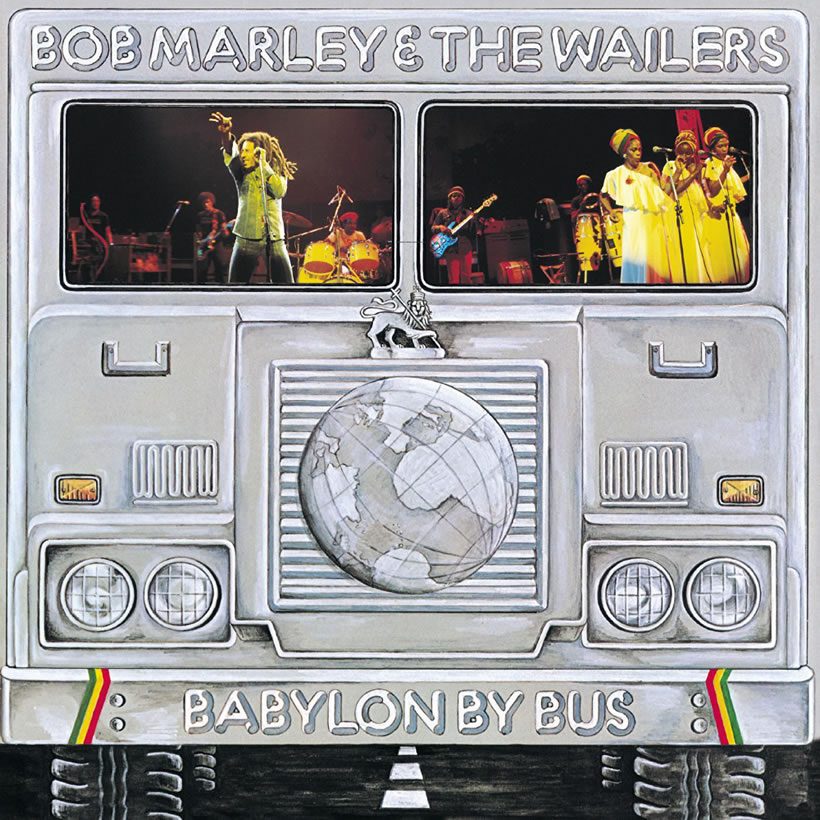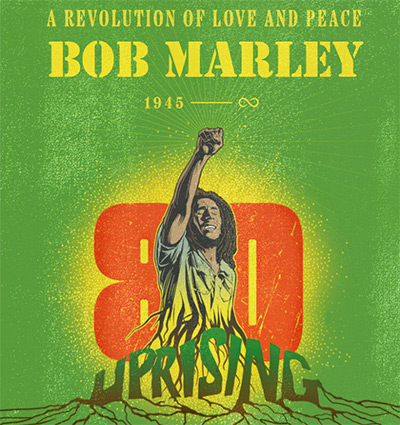Bob Marley & The Wailers – Babylon By Bus
‘Babylon By Bus’ was a live double album, recorded for the most part during a three night run of shows in June 1978.

Babylon By Bus was a live double-album, recorded for the most part during a three-night run of shows in June 1978 at the 10,000-capacity Pavillon de Paris in France, and released on November 10. It was the second album to be released by Bob Marley and the Wailers in 1978, a year during which the band also slotted in a “world” tour to promote the previous album, Kaya. This was some workload for a man who had been diagnosed with malignant cancer of the toe the year before. And it was some balancing act for a band whose music embodied the raw street-spirit of their shantytown origins yet who were now routinely required to deliver a full-scale, bread-and-circuses spectacle on some of the world’s biggest indoor stages.
The start of the Kaya tour was subject to delay owing to health problems, not with Marley, but with the Wailers’ guitarist Junior Marvin, who had joined the group in February 1977 soon after Marley moved to London. Not to be confused with Junior Murvin of “Police And Thieves” fame (who died in 2013), Marvin was a flamboyant performer who added a key element of rock & roll swagger to the Wailers stage show. Indeed, such was his contribution, that Marvin’s health issues were enough to force the rescheduling of several shows before the Kaya tour finally got underway in Ann Arbor, Michigan on May 18.
The tour ran through America and Europe ending in Miami, Florida on August 5, 1978. The sole UK date, at the Bingley Hall, Stafford on June 22, did not quite reach the heights of the legendary Lyceum shows in 1975 which resulted in Marley’s first and definitive live album Live! (often referred to as Live At The Lyceum). But the reaction to that album, which had already acquired fabled status, nevertheless encouraged Island to go back sooner rather than later for another, and indeed bigger, bite of the cherry with Babylon By Bus. (The title was lifted from the headline of a review of the Bingley Hall show in New Musical Express.)
Marley, who was by now not only a performer of considerable experience but also an international folk hero, had cultivated a stage presence that was little short of messianic. “Mr. Marley projects a bizarre abandon on stage that is almost shamanistic in its intensity,” noted the reviewer from the New York Post in a dry summary that referred to the “mysticism of his personality” and which (unwittingly) illuminated the culture clash that lay at the heart of the Marley phenomenon in the West. “It’s quite clear that at least some of his strangeness – the ropey Rastafarian ‘dreadlocks’ falling about his head, the oddly hopping dance steps, the vacantly visionary stare – is in part a carefully assumed theatrical stance, but no less powerful for that,” the Post reporter continued.
The challenge for Babylon By Bus was to capture once again that incredible intensity on two-inch tape, but without replicating the previous Live! album or, for that matter, focusing too much on material from the Kaya album which had only been released nine months before. The fact that the Marley and co-producer Chris Blackwell pulled it off was a testament to the strength and depth of Marley’s repertoire and the finely-honed performing instincts of a band widely recognized as one of the most remarkable live acts in the history of popular music.
While the Wailers were primarily a vehicle for the singing and songwriting genius of Marley, Babylon By Bus provided a one-stop showcase for the musical prowess of the greatest reggae band in the world. The invincible rhythm section – Aston and Carlton Barrett on bass and drums respectively – had remained emphatically in place since 1970. Immutable, immovable, and immeasurable in the scale of their contribution, they provided the bedrock on which the band’s performances were built. Reggae music, with its counterintuitive rhythmic structure – whereby the downbeat comes on the first and third beat in the bar (as opposed to the ubiquitous second and fourth “backbeat” in rock and pop) – is defined by the groove. And from the opening flourish of “Positive Vibration” on Side One to the grand, crowd-whooping, extended finale of “Jamming” at the close of Side Four, the Barretts provided a surefooted succession of the huge, rumbling yet nimble grooves that underpinned the Wailers’ finest work.
Another key element of the Wailers’ sound highlighted on Babylon By Bus was the dextrous backing vocal arrangements performed by Rita Marley, Marcia Griffiths and Judy Mowatt, better known as the I-Threes. Their interweaving parts on “Exodus” were a work of art and with the crowd adding its own impromptu contributions – singing, calling, chanting, cheering – the blend of voices infused the performances with an exultant sense of community.
The frontline players were not going to miss out either, and many of the songs – “Lively Up Yourself,” “Concrete Jungle,” “Rebel Music (3 O’Clock Roadblock)” and others – were stretched out to accommodate blues-wailing guitar solos from Junior Marvin and Al Anderson along with keyboard jams – such as the mad electric piano solo in “Stir It Up” – from Tyrone Downie and Earl Lindo.
Although it was geared more to the grandstanding tastes of the American/rock market than any previous Marley album, Babylon By Bus charted at a disappointing No. 102 in the US, where Marley retained a curious status as a sort of niche superstar. The album reached No. 40 in the UK. But more telling at the time was the huge and enduring impact of the ensuing Babylon By Bus tour which took Marley and the Wailers to Asia and Oceania for the first (and only) time. Arriving in Tokyo for the first of six sold-out shows beginning on April 5, 1979, the band was greeted by mobs of mildly hysterical fans and insistent paparazzi, requiring them hastily to convene a press conference before they’d even left the airport. The visit laid the foundations for a thriving reggae scene that quickly took root in Japan.
A similar greeting awaited them in Australia and New Zealand, where Marley spent time among the Maori and Aborigine communities, who welcomed their Rastafarian visitors as kindred spirits and received Marley as a savior. It is difficult to overstate the impact of the Babylon By Bus tour on the musical and cultural ecosystem of this vast swathe of the Southern Hemisphere, where reggae had only previously been heard on records or (occasionally) the radio. As before in Europe and North America, Marley and the Wailers came, saw, and conquered, turning reggae from a distant curiosity into a focal part of the popular musical fabric.












